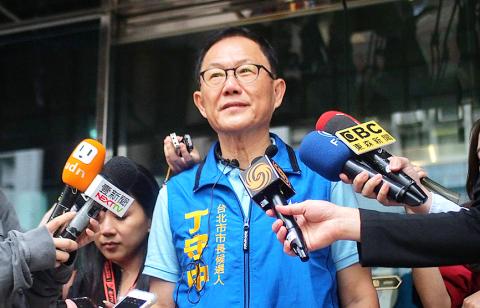Chinese Nationalist Party (KMT) Taipei mayoral candidate Ting Shou-chung (丁守中) yesterday started on a tour that is to see him hold a large campaign event in each of the city’s 12 districts.
The first event was held in Beitou District (北投), which has been part of Ting’s constituency as a lawmaker since 1990 and where he started a campaign “fan club” yesterday.
The tour is to end on Oct. 14 and is to see Ting set up more local “fan clubs.”

Photo: Chien Hui-ju, Taipei Times
Ting said he has represented Beitou for more than two decades and the district has always been close to his heart.
“My performance as a lawmaker has repeatedly been rated as excellent and I have been instrumental in the passage of several bills that improve people’s livelihoods, but the fact that Beitou remains peripheral, with scores of old houses and apartments, weighs on my mind,” Ting told a crowd at the event yesterday.
He pledged that he would build a “universal studios” theme park in Beitou, further develop the district’s most valuable assets — hot springs — and boost tourism.
Former president Ma Ying-jeou (馬英九), who was Taipei mayor from 1998 to 2006, said Ting is a genuine and hardworking politician, adding that he has known him for nearly 40 years.
“During my eight years as mayor and the eight years my successor, [KMT Vice Chairman] Hau Lung-bin (郝龍斌) governed the city, we successfully built Taipei into a world city,” Ma said.
“However, it is now in decline, which is why we need someone like Ting to restore it and make it better,” he said.
If the KMT is to win back Taipei from independent Taipei Mayor Ko Wen-je (柯文哲), Ting must campaign against his opponents more fiercely, while better engaging with Taipei residents and clearly presenting his platform, Ma said.
Hau said that Ting’s efforts at the Legislative Yuan allowed his administration to secure a budget for the 2010 World Flower Expo.
The introduction of low-floor buses in the capital was also in large part due to Ting’s efforts, Hau added.

Civil society groups yesterday protested outside the Legislative Yuan, decrying Chinese Nationalist Party (KMT) efforts to pass three major bills that they said would seriously harm Taiwan’s democracy, and called to oust KMT caucus whip Fu Kun-chi (傅?萁). It was the second night of the three-day “Bluebird wintertime action” protests in Taipei, with organizers announcing that 8,000 people attended. Organized by Taiwan Citizen Front, the Economic Democracy Union (EDU) and a coalition of civil groups, about 6,000 people began a demonstration in front of KMT party headquarters in Taipei on Wednesday, organizers said. For the third day, the organizers asked people to assemble

POOR IMPLEMENTATION: Teachers welcomed the suspension, saying that the scheme disrupted school schedules, quality of learning and the milk market A policy to offer free milk to all school-age children nationwide is to be suspended next year due to multiple problems arising from implementation of the policy, the Executive Yuan announced yesterday. The policy was designed to increase the calcium intake of school-age children in Taiwan by drinking milk, as more than 80 percent drink less than 240ml per day. The recommended amount is 480ml. It was also implemented to help Taiwanese dairy farmers counter competition from fresh milk produced in New Zealand, which is to be imported to Taiwan tariff-free next year when the Agreement Between New Zealand and

A woman who allegedly spiked the food and drinks of an Australian man with rat poison, leaving him in intensive care, has been charged with attempted murder, the Taipei District Prosecutors’ Office said yesterday. The woman, identified by her surname Yang (楊), is accused of repeatedly poisoning Alex Shorey over the course of several months last year to prevent the Australian man from leaving Taiwan, prosecutors said in a statement. Shorey was evacuated back to Australia on May 3 last year after being admitted to intensive care in Taiwan. According to prosecutors, Yang put bromadiolone, a rodenticide that prevents blood from

A Japanese space rocket carrying a Taiwanese satellite blasted off yesterday, but was later seen spiraling downward in the distance as the company said the launch attempt had failed. It was the second attempt by the Japanese start-up Space One to become the country’s first private firm to put a satellite into orbit, after its first try in March ended in a mid-air explosion. This time, its solid-fuel Kairos rocket had been carrying five satellites, including one from the Taiwan Space Agency and others designed by Japanese students and corporate ventures. Spectators gathered near the company’s coastal Spaceport Kii launch pad in Japan’s